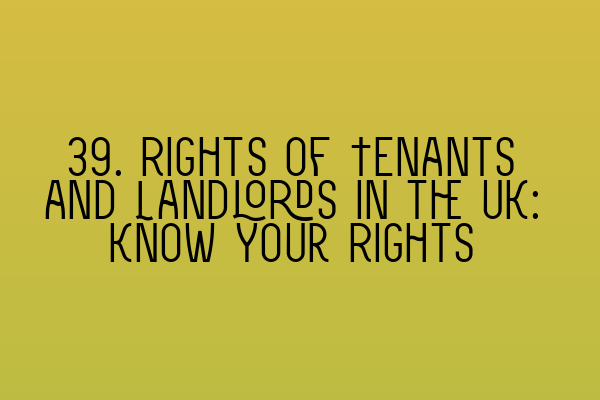39. Rights of Tenants and Landlords in the UK: Know Your Rights
When it comes to renting or leasing a property in the UK, it is important for both tenants and landlords to understand their rights and responsibilities. Knowing your rights can help prevent disputes and ensure a smooth and comfortable living or working environment. In this article, we will explore the rights of tenants and landlords in the UK, providing you with valuable information to guide you through the process.
Tenants’ Rights
Tenants in the UK have several rights that protect them from unfair practices and ensure their well-being. It is crucial for tenants to be aware of these rights in order to assert them whenever necessary.
1. Right to a Written Agreement
As a tenant, you have the right to a written tenancy agreement. This document outlines the terms and conditions of your tenancy, including the rent amount, duration, and responsibilities of both parties. It is important to read and understand the agreement before signing it, and seek legal advice if needed.
2. Right to a Safe and Healthy Property
Tenants have the right to live in a property that meets certain standards of safety and hygiene. Landlords are responsible for ensuring that the property is in good condition and free from hazards. This includes providing working smoke detectors, gas and electrical safety certificates, and proper maintenance of the property.
3. Right to Privacy
Tenants have the right to privacy and peaceful enjoyment of the property. Landlords should not enter the property without prior notice, except in cases of emergency. It is important to discuss and agree upon access arrangements with your landlord to avoid any misunderstandings.
4. Right to Repairs
Tenants have the right to request repairs for any damage or issues in the property that are the landlord’s responsibility. It is recommended to report any problems in writing and keep a record of these communications. If the landlord fails to carry out necessary repairs, tenants may be entitled to compensation or legal recourse.
5. Right to Protection Against Unfair Eviction
Tenants in the UK are protected against unfair eviction. Landlords must follow proper legal procedures, such as giving notice, obtaining a possession order from the court, and providing valid reasons for eviction. It is important for tenants to be aware of their rights in case they face a potential eviction.
For more information on tenants’ rights, take a look at our article on SQE 1 Practice Exam Questions.
Landlords’ Rights
While tenants have certain rights, it is important to acknowledge that landlords also have rights that protect their interests and investment.
1. Right to Receive Rent
Landlords have the right to receive rent from their tenants in a timely manner as agreed upon in the tenancy agreement. If the tenant fails to pay rent, landlords may take legal action to recover outstanding payments. It is advisable for landlords to have a clear rent collection policy and ensure they provide tenants with appropriate notice periods for any rental increase.
2. Right to Proper Use and Care of Property
Landlords have the right to expect that tenants will use and care for the property responsibly. Tenants should adhere to the terms of the tenancy agreement, including any restrictions on activities or changes to the property. If tenants cause damage beyond normal wear and tear, landlords may deduct the cost of repairs from the security deposit.
3. Right to Access for Inspections and Repairs
In order to maintain the property, landlords have the right to access the property for inspections and repairs. However, it is important for landlords to provide reasonable notice and obtain the tenant’s consent, except in cases of emergency. Respect for the tenant’s privacy is crucial, and landlords should ensure that access is limited to necessary purposes.
4. Right to Recover Possession of the Property
Landlords have the right to recover possession of their property under specific circumstances, such as when the tenancy agreement has expired or the tenant has breached the terms of the agreement. However, landlords must follow the proper legal procedures and obtain a possession order from the court to ensure a lawful eviction.
5. Right to Properly End a Tenancy
Landlords have the right to end a tenancy when it is legally permissible to do so. This could be due to reasons such as selling the property or wanting to use it for personal purposes. However, landlords must provide tenants with proper notice and comply with the specific rules and regulations regarding ending a tenancy.
To learn more about the rights and responsibilities of landlords, check out our article on SQE 1 Practice Mocks FLK1 FLK2.
Conclusion
Understanding the rights of tenants and landlords is essential for a harmonious and lawful rental relationship. By familiarizing yourself with the rights and responsibilities outlined in this article, you can protect yourself as a tenant or as a landlord. If you require further guidance or legal advice, it is recommended to consult with a qualified solicitor who specializes in property law.
For more information about property law and related topics, visit our website and explore our SQE 2 Preparation Courses and SQE 1 Preparation Courses. Stay informed and updated with the latest information on SRA SQE Exam Dates.
